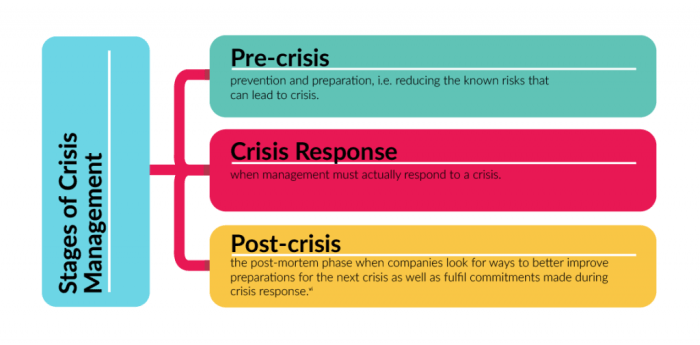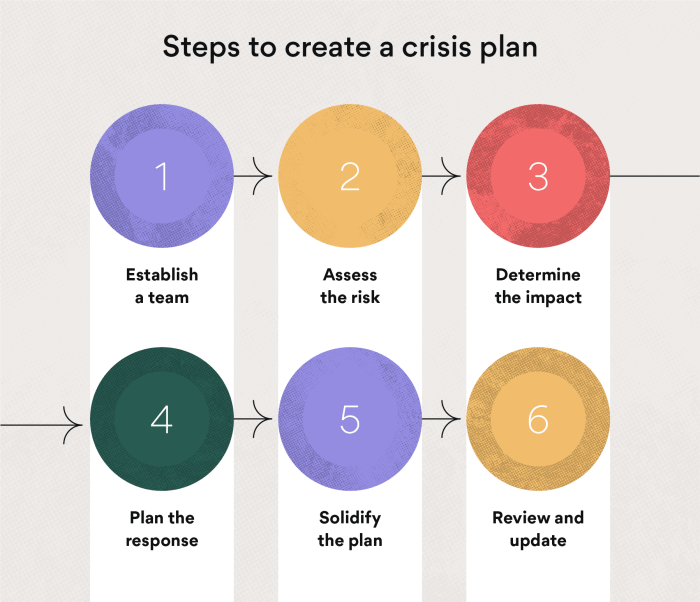Developing a Crisis Management Plan is vital for businesses to navigate through unexpected challenges effectively. From outlining key components to creating a response team, this plan is a game-changer.
Importance of Developing a Crisis Management Plan

Having a crisis management plan is crucial for businesses to effectively navigate unexpected challenges and minimize potential damages.
Mitigating Risks
- During the Tylenol poisonings in the 1980s, Johnson & Johnson’s crisis management plan helped them recall products, address the issue transparently, and regain consumer trust.
- In 2010, when BP faced the Deepwater Horizon oil spill, their lack of a robust crisis management plan led to widespread environmental damage, legal battles, and a tarnished reputation.
Consequences of Not Having a Crisis Management Plan
- Without a crisis management plan, businesses risk making hasty decisions under pressure, leading to potential financial losses, damaged reputation, and even closure.
- When United Airlines mishandled the passenger removal incident in 2017, the lack of a proper crisis management plan resulted in public outrage, boycotts, and a significant drop in stock prices.
Components of a Comprehensive Crisis Management Plan
In order to effectively manage a crisis, it is essential to have a well-thought-out crisis management plan in place. This plan should include key components that address various aspects of crisis response and recovery.
Key Components of a Crisis Management Plan
- An emergency response team with clearly defined roles and responsibilities.
- Established communication protocols for internal and external stakeholders.
- Procedures for assessing the severity and impact of a crisis.
- Strategies for swift decision-making and resource allocation.
- Continuity plans to ensure essential business functions can continue during a crisis.
- Training programs to prepare employees for potential crisis scenarios.
Importance of Communication Strategy
Having a communication strategy within the crisis management plan is crucial for ensuring timely and accurate information is shared with various stakeholders. Clear and consistent communication can help maintain trust, minimize confusion, and mitigate the impact of the crisis.
Conducting a Risk Assessment
One of the initial steps in developing a crisis management plan is conducting a risk assessment to identify potential crisis scenarios. This involves evaluating internal and external threats, assessing vulnerabilities, and determining the likelihood and impact of various risks. By understanding the potential crises that could arise, organizations can proactively plan and prepare for effective response and recovery.
Creating a Crisis Response Team

In times of crisis, having a well-prepared and efficient crisis response team is crucial for effectively managing and mitigating the situation. Let’s dive into the process of selecting and training individuals for a crisis response team, the roles and responsibilities of team members during a crisis, and best practices to ensure the team’s effectiveness.
Selection and Training of Team Members
When forming a crisis response team, it is essential to select individuals who possess a diverse set of skills and expertise relevant to crisis management. This may include individuals with backgrounds in communication, decision-making, problem-solving, and leadership. Training should focus on developing these skills further and ensuring that team members are well-equipped to handle various types of crises effectively.
- Provide specialized training sessions on crisis communication, decision-making under pressure, and conflict resolution.
- Conduct regular drills and simulations to practice response strategies and enhance coordination among team members.
- Offer opportunities for team members to attend workshops, seminars, and conferences related to crisis management to stay updated on best practices and industry trends.
Roles and Responsibilities During a Crisis
Each member of the crisis response team plays a crucial role in managing a crisis smoothly and efficiently. Clearly defined roles and responsibilities ensure that everyone knows what is expected of them and how they can contribute to the team’s overall success.
- The Crisis Manager: Leads the team, makes critical decisions, and serves as the primary spokesperson during the crisis.
- Communications Specialist: Manages internal and external communications, including media relations and updates to stakeholders.
- Operations Coordinator: Oversees logistical aspects of the response, such as resource allocation and coordination of response efforts.
- Subject Matter Experts: Provide specialized knowledge and guidance related to specific aspects of the crisis, such as legal, technical, or medical expertise.
Best Practices for Ensuring Effectiveness
To ensure that your crisis response team operates effectively and efficiently, consider implementing the following best practices:
- Establish clear lines of communication and reporting structures within the team to facilitate quick decision-making and information sharing.
- Regularly review and update the crisis management plan to adapt to changing circumstances and emerging threats.
- Conduct post-crisis debriefings to evaluate the team’s performance, identify areas for improvement, and incorporate lessons learned into future response strategies.
Testing and Updating the Crisis Management Plan
Regularly testing the crisis management plan through simulations is crucial to ensure its effectiveness when a real crisis occurs. By conducting these tests, organizations can identify gaps, weaknesses, and areas for improvement in the plan.
Methods for Evaluating Plan Effectiveness, Developing a Crisis Management Plan
- Conduct tabletop exercises where team members discuss and walk through different crisis scenarios.
- Run full-scale simulations that replicate real-life crisis situations to test the response of the crisis management team.
- Evaluate the response time, communication effectiveness, decision-making process, and overall coordination during the simulation.
Updating the Crisis Management Plan
- After testing, gather feedback from participants and stakeholders involved in the simulation to identify areas of improvement.
- Review the lessons learned from the testing to update the crisis management plan accordingly.
- Make revisions to the plan based on the identified weaknesses and implement changes to enhance the organization’s crisis response capabilities.